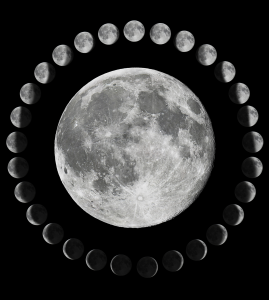The first mitzvah given to the Jews as a nation, while still in Egypt, was to sanctify the months based upon the new moon. This mitzvah forms the foundation of the Jewish holidays, the celebration of which depends upon our counting of the months and days from the sighting of the new moon.
Today, we no longer wait for the sighting of the new moon by witnesses. Instead, the final Sanhedrin, or Supreme Jewish Court, calculated and sanctified the Rosh Chodesh, the first day of the Jewish month for the next thousands of years. These early sages calculated the lunar calendar with remarkable precision, leading to startling accuracy until today, thousands of years later.
It is not insignificant that this, of all mitzvos, should be the very first given to the Jews, well before the Ten Commandments. This reveals much about our relationship to the mitzvos, the lunar cycle, and insight regarding the Jewish people.
The Hebrew for month, as seen from the above mentioned verse, is “Chodesh.” This comes from the root “Chadash,” which means New.
One message implicit in this is that we are always to perform the mitzvos with a feeling of freshness and newness, not to execute them by rote. This entails injecting the feelings you have that day or that moment into the performance of that mitzvah, forging a unique connection with G-d. No two times you perform a mitzvah should ever be the same!
This is reflected by the moon which waxes and wanes, sometimes more present and at times more elusive, but never the same. The way the moon presents itself to us teaches us to always be renewed.
This is part of the reason that the Sanctification of the Months is the first mitzvah commanded to the Jewish people. It serves as an intro to all following mitzvos. It teaches us to follow the lead of the first mitzvah – Rosh Chodesh – which is fresh and new and invigorating by its very essence. Chodesh – Chadash, new!
We further see this in the words of the Shema, which say, “these words should be today upon your heart.” This mean that every day the words of Torah should be as fresh and new as the day they were given at Sinai.
The Jews, as a people, are connected to the mitzvos on a very deep level. For this reason the Jewish nation is constantly being renewed. Unlike the sun which remains static and unchanging, the moon waxes and wanes. At one point during the month it seems to disappear completely, only to suddenly appear anew and on its way to its fullness and complete splendor.
Throughout our history have we gone through times that seemed as though the end of our people had arrived. We have seen the destruction of two temples both followed by subsequent exiles and annihilation of our homeland. We’ve been faced by Haman’s “final solution” and endured, resulting in the holiday of Purim. Greek persecution nearly destroyed our people by decrees and assimilation, and we remained vigilant, hence the holiday of Chanukah. We have faced pogroms, inquisitions and the unspeakable holocaust. Each time sociologists and historians pronounced us dead or too weak to go on. We were hidden like the moon. But alas (to the chagrin of those who hoped we were truly finished), we were back!
In no small part, it is our performance of mitzvos with newness that has kept our nation fresh and new, despite all the efforts to trample us, giving us the strength and Divine connection to continue to survive. That’s the one, most important thing we can all do in the face of the newest threats on our existence with the threat of assimilation – renew our commitment to mitzvos and Torah study, which will ensure our survival!
Although we rely upon the calendar, we still retain a special blessing which is recited each month upon the renewal of the new moon. Part of this blessing is a prayer that just like the moon constantly renews itself (in the way it is seen by us), so too should the Jewish people become renewed. Just as the fetus is hidden during pregnancy, we too are hidden during this period of exile. As the new baby emerges we, too, should emerge in our full glory.
May we see this soon!
Rabbi Yerachmiel Fried


